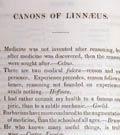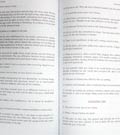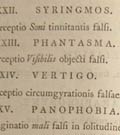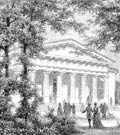Cabinet 15 - As a Physician
 'If on the rules of diet, he [Linnaeus] often made his students roar with laughter by his descriptions of the follies of fashion, using a joke and a light touch to teach a valuable lesson about the care and preservation of health.' So wrote Sven Hedin, one of the many students who were impressed by Professor Linnaeus's ability to lecture. Linnaeus, who was a practising physician, also wrote Materia Medica (1749), a useful reference book for doctors. Fond of aphorisms such as 'all excess is harmful' and 'eat to keep up your strength, not to stuff your belly', he also penned medical 'Canons' as seen in this English translation of that work by Charles Whitlaw.
'If on the rules of diet, he [Linnaeus] often made his students roar with laughter by his descriptions of the follies of fashion, using a joke and a light touch to teach a valuable lesson about the care and preservation of health.' So wrote Sven Hedin, one of the many students who were impressed by Professor Linnaeus's ability to lecture. Linnaeus, who was a practising physician, also wrote Materia Medica (1749), a useful reference book for doctors. Fond of aphorisms such as 'all excess is harmful' and 'eat to keep up your strength, not to stuff your belly', he also penned medical 'Canons' as seen in this English translation of that work by Charles Whitlaw.
Charles Whitlaw, Whitlaws New Medical Discoveries with a Defence of the Linnaean Doctrine. London: Published by the author, 1829. Medical Monro M313
 Linnaeus was interested in the problems of divine retribution on earth, and at some time he began Nemesis Divina, a ragbag of gossipy anecdotes which were mainly moral in content and were intended for his son's eyes only. The subjects covered include 'Death', 'Avarice', 'Ghosts', 'Friendships', 'Incest', or individuals such as 'Madam N.N.', 'My brother Samuel', 'Solander', 'Charles II', 'Caesar'. Extracts from this work were first printed in 1852. This is the first full English translation.
Linnaeus was interested in the problems of divine retribution on earth, and at some time he began Nemesis Divina, a ragbag of gossipy anecdotes which were mainly moral in content and were intended for his son's eyes only. The subjects covered include 'Death', 'Avarice', 'Ghosts', 'Friendships', 'Incest', or individuals such as 'Madam N.N.', 'My brother Samuel', 'Solander', 'Charles II', 'Caesar'. Extracts from this work were first printed in 1852. This is the first full English translation.
Carl von Linnè, Nemesis Divina. Dordrecht, The Netherlands: Kluwer Academic Publishers, 2001. Special BT 135 LR39
The Botanical Gardens at Uppsala University, 1874. Drawing by C. S. Hallbeck, from Svenska Familj-Journalen (1864-1887).
 Although Linnaeus spoke no English, he did visit England, meeting and maintaining ties with a circle of botanists surrounding Sir Hans Sloane (1660-1753), physician, scientist and collector. As a physician himself, Linnaeus specialised in diagnosing and curing venereal diseases. Although there is no evidence of their meeting, he presumably knew the work of William Cullen (1710-1790), a Scottish doctor, who was a well-known nosologist, a branch of medicine that deals with the classification of diseases. Cullen was a kindred classifier, and his Synopsis Nosologiae Methodicae contains his classification of disease into four classes, of which 'neuroses', a term Cullen coined, was one of them. The copy on display is a presentation copy from Cullen to Dr Alexander Monro.
Although Linnaeus spoke no English, he did visit England, meeting and maintaining ties with a circle of botanists surrounding Sir Hans Sloane (1660-1753), physician, scientist and collector. As a physician himself, Linnaeus specialised in diagnosing and curing venereal diseases. Although there is no evidence of their meeting, he presumably knew the work of William Cullen (1710-1790), a Scottish doctor, who was a well-known nosologist, a branch of medicine that deals with the classification of diseases. Cullen was a kindred classifier, and his Synopsis Nosologiae Methodicae contains his classification of disease into four classes, of which 'neuroses', a term Cullen coined, was one of them. The copy on display is a presentation copy from Cullen to Dr Alexander Monro.

